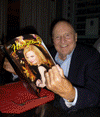|
In 1986, Stephen Holden joined the Culture Staff of the New York Times as a roving theatre, film and cabaret critic. A decade later, he was elevated to second-in-command film critic before assuming head film critic stature upon his predecessor, Janet Maslin’s retirement. Today, Holden anchors a staff of three (the others being A.O. Scott and Elvis Mitchell) responsible for film commentary and criticism at the Times. A Yale graduate, Holden, is a self proclaimed “film addict” who marvels that he is compensated “for doing a job I would pay to do.” An elder (Holden is 62) and revered statesman in his field, Holden’s film criticisms are widely quoted and he is and has been a frequent, sought after guest on such programs as 60 Minutes, 20/20, NBC Nightly News, Entertainment Tonight, Great Performances, and National Public Radio. A poet whose work has been included in The New Yorker Book of Poems, Holden is the recipient of a Grammy Award for his collaborative effort for Best Album Notes for The Voice: The Columbia Years, a Frank Sinatra anthology. Recently Holden stopped by Hampton Sheet offices to discuss with writer, Alan Ebert, film, film criticism and the pleasures, perks and perils of being a film critic for the New York Times.
Alan Ebert:
Prior to becoming a film critic, did you study, write, or direct films? If not, do you think it’s fair to criticize those who have?
Stephen Holden:
A deep interest in film is obviously the first prerequisite to be a critic. Of course, everyone who goes to movies is a film critic. I’ve studied and read so much about film that I think I know more than the average person, although I am no walking encyclopedia and don’t have a photographic memory. Unlike some critics, I have never considered directing a film or writing a screenplay. My interest in movies has always been the enthusiasm of a movie buff that discovered movie criticism as a teenager reading James Agee. Back then, I wrote little reviews in a journal I kept. Although I couldn’t have articulated it at the time, I saw movies as reflections of our collective dream life.
AE:
What do you think makes a film critic great? For example, do you have any role models you particularly admire or enjoy that influence your approach to reviewing?
SH:
To me, a “great” film critic is someone with a solid bedrock of knowledge that conveys a passion for the medium, along with a sharp critical intelligence. In examining the Hollywood films of the 40’s, James Agee was witty and irreverent. Later, in the early 60’s, it was Dwight McDonald in Esquire. Then came that critical volcano, Pauline Kael, who wrote with a passion and punch and personal involvement that influenced an entire generation of critics, who aped her style. Her timing was fortunate. She ascended at the New Yorker at the moment when a new generation of filmmakers was making its mark in Hollywood. Her enthusiasms could be loony; but she made you feel loving the movies wasn’t just a fantasist’s guilty pleasure but an immersion in an art form that had cultural clout.
AE:
Are you aware of the power you wield as a film critic?
SH:
I’m not comfortable thinking of myself as wielding power and whatever power I do wield really isn’t mine but comes from the Times imprimatur. Movie criticism at the Times isn’t the same as theater, in which the Times has a make-or-break power over many Broadway shows. In film criticism, television critics like Ebert and Roeper have far more influence on mass taste than any print critics. That said, the studios all want quotable superlatives, which a critic can consciously dispense or withhold; and a juicy Times quote can be the cherry on the sundae. But the influence of a Times critic on a popcorn movie like Charlie’s Angels or an Adam Sandler movie is negligible. The audience that wants to see it will no matter what. The Times review, however, does have a direct impact on smaller independent and foreign films.
AE:
Does it enter your mind that your review can influence a studio’s stock, a director’s career, or the state of an entire studio?
SH:
I’m aware that a strongly positive review can give a little boost to a director’s career. The consideration of a movie studio’s financial health however never enters my mind when I’m reviewing.
AE:
With so much often riding on a good review from the Times, are there ever influences brought to bear from outside sources, such as a courting to insure a good review?
SH:
I am largely protected from spin-doctors by the person(s) who oversee the Times’ movie desk. There are publicists who often beg for such and such a reviewer to cover a certain film but by the time those requests come, the assignment has been made. Sometimes a publicist calls me directly and asks what I thought or solicits an advance quote. You try to be vague but polite, and of course you can’t give that advance quote even if you want to.
AE:
Should a reviewer—and in particular a New York Times reviewer—have the power s/he has? In truth, people don’t say Stephen Holden or Elvis Mitchell hated or loved the film, but say, “The Times loved it,” or, “The Times hated it.” Would it be more equitable if all three of the Times reviewers review the same film so that readers could get three points of view about the same film?
SH:
Some readers follow individual bylines; while others don’t, and imagine that whatever opinion they absorb is that of the paper, an editorial decision. Our tastes are not exactly the same, but they’re also not too wildly dissimilar. If all three of us reviewed every major film, there would be no room left in the arts section for the rest of culture; and I think readers would be confused and ultimately bored.
AE:
Do you think there is a gay sensibility that you, or other “out” gay reviewers, bring to reviews?
SH:
Speaking of myself, no. The only publications in which I detect a gay sensibility in their reviews are gay oriented magazines or tabloids like The Advocate, where gay-oriented films are often scrutinized for their sexual and political content. To its credit, within the New York film critic community, I discern little if any anti-gay bias. Since I don’t read the far right-wing press, I couldn’t tell you about its criticism or attitudes toward gay-themed movies. At the Times, the three of us that review film are highly sensitive to issues of race, gender, and sexual orientation in the movies. Elvis Mitchell, being African-American, and highly sensitive to racial issues and employment in Hollywood, does go out of his way to mention African-American contributions to the movies he reviews. I applaud his courage and diligence in doing it.
Alan Ebert is the author of the novels Traditions, The Long Way Home, and Marriages. His profiles of such luminaries as Katherine Hepburn, Elizabeth Taylor, Warren Beatty, Jack Lemmon, Lena Horne and Carol Burnett have appeared in most major magazines. His latest book, Intimacies, is a compilation of his best interviews as they originally appeared.
|




